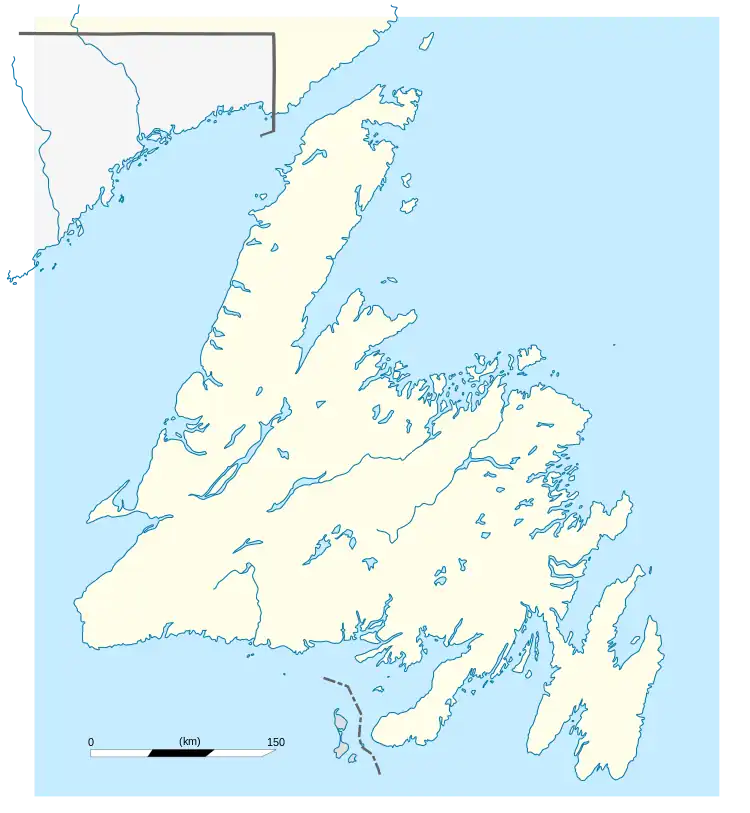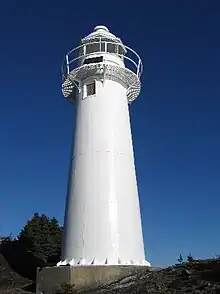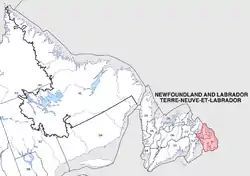Bay Bulls, Newfoundland and Labrador
Bay Bulls (2021 population: 1,566[2]) is a small fishing town in the province of Newfoundland and Labrador, Canada.
Bay Bulls | |
|---|---|
Town | |
 Bay Bulls in August, 2006 | |
 Bay Bulls Location of Bay Bulls in Newfoundland | |
| Coordinates: 47°18′57″N 52°48′37″W | |
| Country | Canada |
| Province | Newfoundland and Labrador |
| settled | 1635-1638 |
| Government | |
| • Mayor | Keith O'Driscoll |
| Area | |
| • Land | 30.74 km2 (11.87 sq mi) |
| Population (2021)[2] | |
| • Total | 1,566 |
| • Density | 48.8/km2 (126/sq mi) |
| Time zone | UTC-3:30 (Newfoundland Time) |
| • Summer (DST) | UTC-2:30 (Newfoundland Daylight) |
| Area code | 709 |
| Highways | |
| Website | www |
| Bay Bulls Lighthouse | |
 | |
| Constructed | 1908 |
| Foundation | concrete base |
| Construction | cast iron tower |
| Height | 11 m (36 ft) |
| Shape | cylindrical tower with balcony and lantern |
| Markings | white tower and lantern |
| Power source | solar power |
| Operator | Canadian Coast Guard[3][4] |
| Heritage | recognized federal heritage building of Canada |
| Focal height | 62 m (203 ft) |
| Lens | fourth ordered Fresnel lens |
| Range | 7 nmi (13 km; 8.1 mi) |
| Characteristic | Fl W 6s |
Geography
Located in a sheltered bay, it has been home to many fishermen and a strategic location in early times as it is located just a few miles from the capital, St. John's.
History
Bay Bulls first appears on a 1592 map drawn by Thomas Hood.
Fortification of the harbour came in 1638 by Governor David Kirke. In 1665, Bay Bulls was raided by Dutch sailors under Admiral De Ruyter. During King William's War, the village was attacked twice. In 1696, Monbeton de St. Ovide de Brouillan, the governor of Placentia, attacked Bay Bulls from the sea, resulting in the scuttling of the English warship HMS Sapphire. Then in 1697 Pierre Le Moyne d'Iberville marched overland from Placentia and attacked Bay Bulls in the Avalon Peninsula Campaign. In 1702, Commodore John Leake of the Royal Navy entered Bay Bulls with several Men of War, and received information about the whereabouts of French ships and unprotected settlements around the Avalon Peninsula, which he then attacked. On June 24, 1762, the French led by Admiral d'Arsac de Ternay, landed seven hundred men who occupied Bay Bulls and marched to St. John's. Bay Bulls suffered its last invasion on September 29, 1796, when Admiral Richery attempted to storm St. John's but finding it well defended; he attacked and burned Bay Bulls instead.
In 1890 the Roman Catholic Church, St. Peter and St. Paul was rebuilt. The gate was initially marked by cannons left over from the battles with the French, then statues of the Saints were added on top, which gave the famous "Canonized Saints of Bay Bulls."
Demographics
In the 2021 Census of Population conducted by Statistics Canada, Bay Bulls had a population of 1,566 living in 597 of its 631 total private dwellings, a change of 4.4% from its 2016 population of 1,500. With a land area of 30.6 km2 (11.8 sq mi), it had a population density of 51.2/km2 (132.5/sq mi) in 2021.[2]
Economy

Bay Bulls is a fishing community and was established because it is close to the rich fishing grounds on the Grand Banks. Due to its proximity to St. John's, the town is becoming more of a bedroom community for people employed there. Bay Bulls has been at the forefront of many strategies such as fish farming and lately servicing the Oil and Gas industry. The Penney Group of Companies has built a repair facility that services the many oil rigs that drill for oil on the Grand Banks. Tourism has become an important part of the community as well. Four whale and bird watching establishments, as well as several bed-and-breakfast places, attract visitors from all over the world.
Image gallery
 Bay Bulls Harbour
Bay Bulls Harbour St. Peter and St. Paul Church, showing the "canonized saints"
St. Peter and St. Paul Church, showing the "canonized saints"
References
- "Census Profile - Bay Bulls". Statistics Canada. Retrieved 29 October 2016.
- "Population and dwelling counts: Canada, provinces and territories, census divisions and census subdivisions (municipalities), Newfoundland and Labrador". Statistics Canada. February 9, 2022. Retrieved March 15, 2022.
- Rowlett, Russ. "Lighthouses of Canada: Southeastern Newfoundland". The Lighthouse Directory. University of North Carolina at Chapel Hill. Retrieved 2017-02-06.
- List of Lights, Pub. 110: Greenland, The East Coasts of North and South America (Excluding Continental U.S.A. Except the East Coast of Florida) and the West Indies (PDF). List of Lights. United States National Geospatial-Intelligence Agency. 2016.
